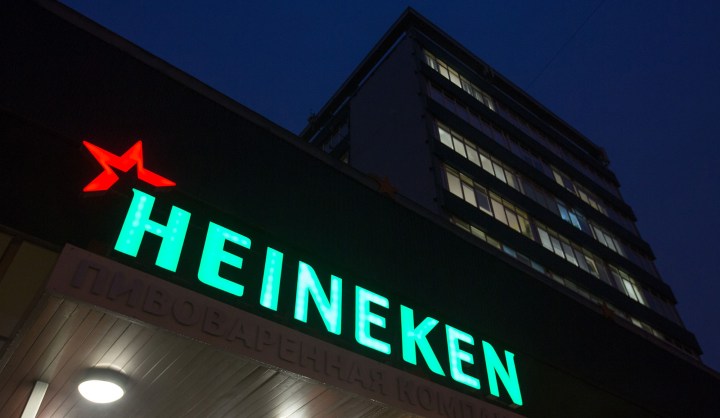BUSINESS MAVERICK
Heineken’s potential takeover of Distell could bring cheer to SA and a hungover alcohol industry

A successful takeover could unleash huge investment flows into South Africa at a time when the alcohol sector is still reeling from the sales bans that the government implemented to help contain a resurgence of Covid-19 infections.
The government’s four bans on alcohol sales since the start of the Covid-19 pandemic in March 2020 have not completely dented the investor appetite for acquisition opportunities in South Africa’s beaten alcoholic beverages industry.
This is judging from the move by the Dutch brewing company Heineken, which has expressed an interest in acquiring SA-based Distell, the maker of brands including Klipdrift brandy, Savanna cider, JC le Roux sparkling wines and Amarula liqueur.
Distell told investors on Tuesday that its share price could be affected by the acquisition talks with Heineken. And indeed, its share price jumped by as much as 10.4% to R158 during Tuesday’s intraday trade – levels last seen in November 2017.
Distell said the talks with Heineken did not necessarily mean a merger would take place. Heineken, which is listed in Amsterdam and owns beer brands Amstel and Sol, concurred with Distell’s sentiments.
If Heineken buys Distell, it would be its biggest investment since its $3.1-billion (R43-billion) purchase of a 40% stake in China Resources Beer in 2018, according to a Bloomberg report.
Opportunity for Heineken
The potential deal is interesting for several reasons.
First, it seemed Heineken was starting to pare down its investments in South Africa as it became the first major company to cut jobs due to the alcohol sale bans. In January 2021, Heineken announced plans to reduce its South Africa workforce by about 7%, or 70 positions out of 1,000.
At the time, big businesses were voting with their balance sheets, pushing the government into a corner to reconsider its approach to alcohol bans. Heineken’s job cuts announcement followed the decision by SAB, a unit of the world’s largest brewer, AB InBev, to cancel R2.5-billion in planned investment.
But now, Heineken wants to support South Africa.
Second, the potential deal might be opportunistic and cheaper for Heineken, as Distell’s share price crashed by 28% in 2020. The share price has since recovered.
Market watchers believe that the second reason holds water. Ron Klipin, the senior portfolio manager at Cratos Capital, said Heineken is looking for growth opportunities in emerging markets, starting with large-scale investments in South Africa.
“The potential deal works well for Heineken because it is an opportunity to move into higher-margin alcohol beverages as opposed to beer,” Klipin told Business Maverick.
Chris Gilmour, an independent analyst, agreed with Klipin, saying that there are no more meaningful global beer acquisition opportunities and Heineken is “inevitably turning its attention to wines and spirits”.
Heineken has been forced to diversify because beer consumption patterns in the US have fallen over the past five years by 2.4%, with consumers embracing canned wine, spirits, spiked seltzers, and premade bottled cocktails, according to research firm IWSR.
Distell excels in the wine and spirits category. In 2020 alone, Distell managed to be profitable, helped by stronger sales volumes in wine, spirits, and ready-to-drink categories (premixed cocktails), in markets including Kenya, Nigeria, and Mozambique, and also in South Africa despite the alcohol sales ban. There were also market share gains in the three categories.
Distell is expanding into new beverage categories such as wine coolers and alcopops.
Investment flows into SA
A successful merger could unleash huge investment flows into South Africa at a time when the alcohol industry is still reeling from the alcohol sales bans that the government implemented to help contain a resurgence in Covid-19 infections.
Research from alcohol industry lobby groups – such as the South African Liquor Brand Owners’ Association – estimated that the three bans in 2020 (excluding the one implemented over the 2021 Easter weekend) cost the entire industry R36.3-billion in lost revenue, with 200,000 jobs put at risk in both the formal and informal sectors. And the government lost nearly R30-billion in taxes that are normally paid by alcohol players across the value chain – such as farmers, bottlers, and sellers.
The potential acquisition of Distell by Heineken might shore up the fiscus as Heineken would be required to pay tax if the transaction is successful. It would also be required to pay more corporate taxes in South Africa from its profits.
The potential acquisition would be the second large-scale one for South Africa’s beverage industry since AB InBev bought SAB for $106-billion in 2016. And, like the AB InBev-SABMiller takeover, the potential Heineken-Distell takeover will be complex to conclude. South Africa’s competition authorities are likely to impose job creation, local procurement, and supplier development conditions on the deal. And the potential deal will require approval from several Distell shareholders, including the Public Investment Corporation (PIC), which owns 31.7% of Distell shares, and Remgro, which owns 31.4% of Distell.
Said Cassie Treurnicht, the senior portfolio manager at Gryphon Asset Management: “Remgro would be very reluctant to let its shareholding go unless they get a very good price for it, in which case it would make it a bad deal for Heineken. The PIC, we feel, are also more inclined to hold on to local assets such as Distell.” DM/BM



















 Become an Insider
Become an Insider
Maybe we should hold on to Distell. Nice customer could be China. Seeing that Australia doesn’t have the finesse like America when it gets to banning imports. As Heineken said, beers are down and wines are up. Sounds like we have the right company for that. Why sell now, sell later for more?